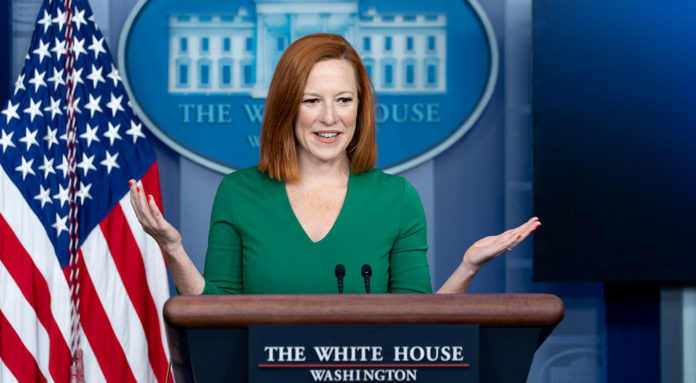The great, independent journalist I.F. Stone famously wrote that “all governments lie.” But for access-based Washington reporters, it’s never easy to contemplate that their sources are actively misleading them. It’s even harder to confront them.
That’s why it was such a welcome surprise on Thursday to hear NPR’s Ayesha Rascoe push back when White House Press Secretary Jen Psaki asserted, without providing any evidence, that ISIS leader Hajji Abdullah had detonated a suicide vest during a special forces raid of his home in Syria.
It was also a healthy sign that at the State Department, AP reporter Matt Lee didn’t accept spokesman Ned Price‘s assertion about an alleged Russian false-flag operation on face value.
It was grotesque that Psaki and Price both responded to being openly doubted by suggesting it was tantamount to believing ISIS or the Russians over the U.S. government. (Price at least had the grace to sort of apologize.)
But both of them were clearly caught off guard by reporters asking for evidence to back up their claims. (More typical was a press call earlier that morning with two anonymous “senior administration officials,” in which reporters neither requested that the officials speak on the record, not raised any doubts.)
Sadly, from what I can tell, none of the skepticism expressed by Rascoe or Lee actually made it into the mainstream-media coverage of the story. That remains a bridge too far, apparently – even coming only a few weeks after the New York Times brilliantly exposed the government’s initial story about a drone strike in Kabul in August as completely untrue.
There has been a lot of media chatter about Thursday’s back-and-forth, however, including a terrific panel discussion led by Jake Tapper on CNN in which he emphasized that “U.S. intelligence and the Pentagon have not only gotten things wrong before, they have openly lied to the American people before.”
By contrast, he said, “is it not the definition of patriotism for journalists to say, OK, the Pentagon or the intelligence community is saying this, prove it? Where’s the proof?”
Skepticism of government officials – especially when what they say is based on evidence they won’t share – is something the press corps needs to relearn over and over again, if they learn it at all.
I.F. Stone modeled a different way to go about reporting on things the government didn’t want known. In her book, “All Governments Lie!“, biographer Myra MacPherson quoted longtime Washington reporter Marvin Kalb on Stone: “He didn’t care what the ‘senior officials’ said on ‘deep background,’ because I think he assumed they were lying or misleading the press in any case.”
MacPherson also quoted Stone himself: “You cannot get intimate with officials and maintain your independence.” Whether they were “good guys” or “bad guys” was incidental to him. “They’ll use you.”
Back in 2007, when George W. Bush was ratcheting up rhetoric against Iran, and I was deputy editor of the late, lamented NiemanWatchdog.org website, I wrote up a few of the lessons that should have been learned from Vietnam and then should have been learned from Iraq.
The fact is that when military action or intelligence are involved, there’s every reason for journalists to suspect they’re being misled — if not on purpose, then because your sources have been misled as well. Here’s an updated list of lessons from the past:
- Don’t assume anything administration officials tell you is true. In fact, you are probably better off assuming anything they tell you is a lie.
- Demand proof for their every assertion. Assume the proof is a lie. Demand that they prove that their proof is accurate.
- Just because they say it, doesn’t mean it should make the headlines. The absence of supporting evidence for their assertion — or a preponderance of evidence that contradicts the assertion — may be more newsworthy than the assertion itself.
- Don’t print anonymous assertions. Demand that sources identify themselves so that they can be held accountable.
- Don’t assume that these officials, with their access to secret intelligence, know more than you do.
- Alternately, assume that they do indeed know more than you do – and are trying to keep intelligence that would undermine their arguments secret.
- Don’t privilege official statements over what witnesses on the ground said they saw and heard – in fact, quite the opposite. Time and again, the latter have proven to be more accurate. (A few canonical examples here and here.)
- Give voice to the skeptics; don’t marginalize and mock them.
- Listen to and quote the people who got it right last time: The intelligence officials, state department officials, war-college instructors and many others who have been vindicated in the past.
- Offer the greatest and most guaranteed degree of confidentiality to whistleblowers offering information that contradicts the official government position. (By contrast, don’t offer any confidentiality to administration spinners.)
The full quote from Stone actually goes: “All governments lie, but disaster lies in wait for countries whose officials smoke the same hashish they give out.” So Tapper is exactly right: Journalists are doing their patriotic duty when they demand to see the evidence.
